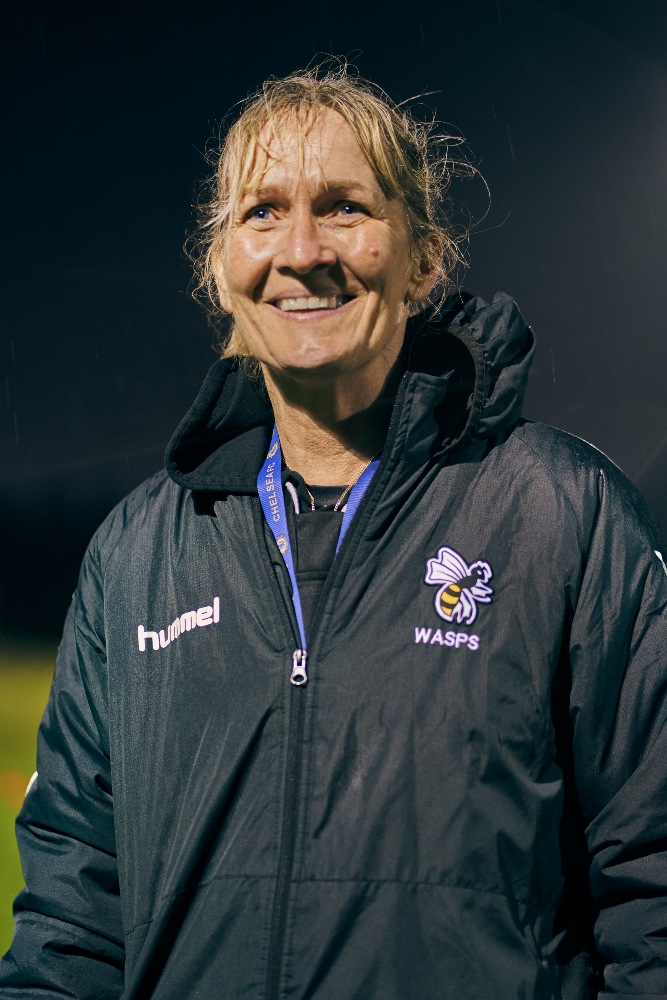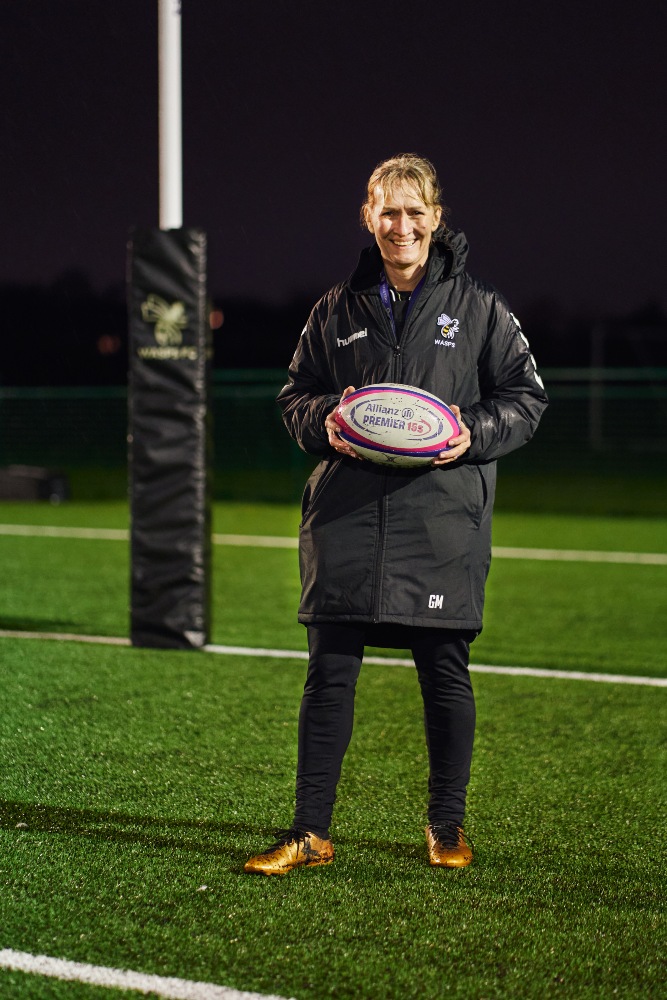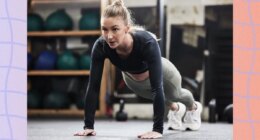
Female First speaks to Giselle Mather all about her journey into coaching
Former rugby World Cup winner and current Director of Rugby at Wasps Women, Giselle Mather, has recently joined the #WomenWhoCoach campaign and is hoping to break the bias around female coaches.
Although the annual International Women’s Day is a great platform to raise awareness, Mather dreams of a day when it’s no longer needed and women are hired for roles because of their skills, not because of their gender.
Mather spoke to Female First about why rugby is her sport of choice, explained why she loves coaching and revealed what more she thinks need to be done to improve gender equality in coaching.
Could you explain what the Women Who Coach movement is and why you wanted to join it?
I was interviewed for part of it before so it’s a group that people want to just get involved in and who do coach to help and support one another to get more women and girls into coaching.
Why rugby?
It’s quite a convoluted one, a wriggly journey to get there to be fair but when I was 10 years old and on my birthday my father took me to Wembley, which was the old Wembley, not the new one, to watch England play Brazil at football. As is typical of my family we were racing to be on time, and as we entered the concourse, we went up the steps and it was already packed, it was about five minutes to kick-off and just the cacophony of noise – and I just stood there like wow, and I can remember that huge impact on me. Watched the game, loved it and then left there saying one day I want to play for my country. It was one of those moments.
Then I didn’t know which sport to do, so I set about doing bits and bobs. I played netball as a youngster, football, I played cricket, I played hockey, did some judo. Then when I was 19 at Exeter University on a BEd teaching degree and we had to do a course on rugby to teach the basic stuff as we had to teach youngsters at school and I really enjoyed that, I thought it was fun. And then the next thing it was like well maybe you should have a go at it and the fact that I’d played netball so my catch pass was really good, in my football I could kick a ball, in judo I could cope with the contact, fencing my footwork was good, cricket – hand-eye coordination, hockey – the understanding of team game.
All of a sudden in a very quick space of time, me and rugby went yeah, we could get along, and so that’s how it happened. All the skills I’d done in my previous stuff all suddenly came together.
You’ve been in your role as the Wasps Women’s Director of Rugby for about six years now, so what keeps you excited and engaged with the job?
Coaching is never dull, that’s the thing. So, since I took on the role in 2016, in those five years it is insane what has happened in how the product has just gone up, the quality of the athlete, the quality of the games, the stuff around us. And then you put that on the backdrop of the explosion of women’s sport, rightly so, it’s been a long time coming this explosion.
Broadcasters are now interested; sponsors don’t really want to know unless a women’s team is involved as well. Again, similar to how I ended up in rugby, all the things that surround it are all coming together in one go, so you’ve got broadcasters, sponsors, athletes, finance going into those things. The players that played before or in any sport that hasn’t had that financial input, medical input – as soon as you put that in the potential that is sitting in those athletes just goes bang and all of this stuff is able to come out and the athletes, if you take them from when they were at the beginning of this journey to five years on they’re unbelievable because they’ve worked so hard individually but they have around them the tools that they need to be the best they can be.
And that’s why my job is never dull because my job is to coach them but to keep trying to provide the stuff they need. They’ll all different, I love them to death, I’m in charge of 40 directly and more indirectly. I’ve got international athletes, I’ve got club athletes, I’ve got young athletes, I’ve got senior athletes, I’ve got experience, I’ve got inexperience – the diversity is just amazing and it’s like every day is different, that’s why.

“We need diversity in the coaching team”, says Giselle Mather
READ RELATED: Does Rachel Deloache Williams From Inventing Anna Have A Boyfriend Or Husband? Her Love Life And Net Worth Details
What more do you think needs to be done to improve gender equality in coaching?
That’s a huge question, so now as I described it as a huge explosion in women’s sport, it’s now very much recognised at the governing body level and at UK sport that this is necessary, that women have an enormous amount to bring and that they need support and guidance in it. What we are now waiting for in my mind is that we need male advocates and the reason that I say that is that 95% of elite particularly coaching teams are male dominated or in their entirety are male. Therefore, it’s going to take a male to hire the female. Until there are male advocates who are brave enough to do that, I think we still have a barrier to get over.
So, the support systems are still there, people are recognising that, the finance going into it is better for women to access and get rid of the barriers that are there. But the actual hiring of these jobs are males that need to do that for females, and then when a female gets that job there is pressure because she’s got to be good in order that they go, ‘yeah we got that decision right,’ and then the floodgates will open. Then you will see diverse coaching teams which bring, and in my opinion, as the Director of Rugby at Wasps I would be very arrogant if I believed that I am the one that unlocks 40 of my athletes. I think I can add something to each of them, of course I do, but am I the one to unlock each of them? No, I’d be really naïve and arrogant if I felt that. So, I need a coaching team, and I have an awesome coaching team, but the more diverse the coaching team, the more chance we’ve got of allowing those athletes to unlock their potential.
We need diversity in the coaching team in order that the athletes go, ‘I need to speak to you right now, you can deal with this, you are the person that helps me the extra little bit.’ And I believe that when you get females onto coaching teams, you’ll bring that, we bring a different thing and that’s not stereotypically, not all women are the same thing and I think we’ve got to be careful of that, that we don’t assume that. And not all men bring the same
thing, we’ve got to be careful that we don’t assume that as well. But by bringing women on you’re going to get a different flavour, you get cognitive diversity as well, we come up with different ideas, different ways of doing things and we’ve had a different journey to get to where we are. So, we’re not clones of what is already there, anyone who brings a slightly different journey to a coaching team adds in my opinion massive value and I think that’s what we’ve got to get to.
We have to have male advocates that are brave enough to go, ‘I’m going to put a woman in charge of this area of the group, this female she knows her stuff.’ So, what’s the problem of putting women in there, and I think you’ll see teams then massively respond – not the coaching team but the team, the athletes massively respond.
What would your message be to women who want to coach?
Regardless of the level you choose to coach at, so whether you’re running around with the under six team or whether you’re running around with international athletes, the issue being that at that moment in time those are the people that are the most important in front of you. They’re the people that are learning from you at that point in time. For the under six team, we don’t know which ones are going to go, ‘sport is my thing.’ We don’t know which ones are going to have the moment I had as a 10-year-old going, ‘This is for me, this is what I want.’ A lot of athletes will often talk about watching the Olympic Games as their moment that they went, ‘I want to do that.’ It could be that you’ve got a coach standing in front of a group of under sixes and they go home, and they go, ‘wow, I loved that.’
Now, if they love that, they’re coming back again and they’re coming back again. Then they find that sport is what they want. Now whether they then become a club player, an international player, just play because they love it recreationally and we know the health benefits of being getting involved in sport, then that coach has done a brilliant job. Encouraging people who are just at the beginning and thinking about it, if they feel that they can impart enthusiasm about something to infect a young person with something so positive, how brilliant is that.
And then now, particularly in women’s sport, there’s an obvious career path, you can see it now. There didn’t necessarily used to be in such a way but now because of all that’s going on around women’s sport and all that’s happening and the fact that see it to be it stuff, you can see it now. You turn on your TV, you’re watching the Women’s Super League, you’re watching the AP15s, you’re watching the cricket and it’s all women playing and whatever sport it may be, the hockey, the curling, the everything – there’s women doing it so the youngsters are going, ‘I could do that.’ Then obviously in that now we’ve got all these female performers.
How important is it to have a day which champions women in International Women’s Day?
I dream of a day when it’s not necessary. I think we’re moving faster and faster towards that day, which is great, but to actually raise awareness again is a good thing. That’s basically what it is at the moment, it’s massively raising awareness of good things that are going on of the people that are involved and of the avenues and ways to become involved – that’s got to be a good thing.
But I do dream of the day where I’m not a female coach, I’m a coach. That is the day that I dream of where it doesn’t matter when putting in an application for a job that they look and go, oh but she’s a woman, or we haven’t got women in this thing, so we have to really stick our necks out and do something brave here. But it’s just like that’s the person, that’s the skill set, that’s the experience, boom, go. So, they’re good, but I dream of a day when they’re not there.
Words by Lucy Roberts for Female First, who you can follow on Twitter, @Lucy_Roberts_72.
RELATED: Rachael Burford discusses her rugby union journey, setting up Girls Rugby Club and more [EXCLUSIVE]
Source:






